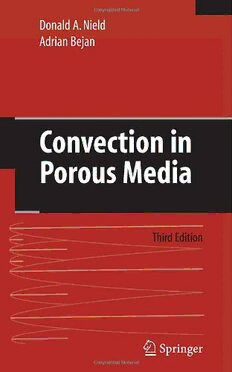Table Of ContentConvection in Porous Media
Convection in Porous Media
Third Edition
Donald A. Nield
UniversityofAuckland
Auckland,NewZealand
and
Adrian Bejan
DukeUniversity
Durham,NorthCarolina,USA
Donald.A.Nield AdrianBejan
AssociateProfessor J.A.JonesProfessorofMechanicalEngineering
DepartmentofEngineeringScience DepartmentofMechanicalEngineeringand
UniversityofAuckland MaterialsScience
PrivateBag92019,Auckland DukeUniversity
NewZealand Durham,NorthCarolina27708
[email protected] USA
[email protected]
LibraryofCongressControlNumber:2005932308
10digitISBN:0-387-29096-6
13digitISBN:978-0387-29096-6
(cid:1)C 2006SpringerScience+BusinessMedia,Inc.
Allrightsreserved.Thisworkmaynotbetranslatedorcopiedinwholeorinpartwithoutthewritten
permissionofthepublisher(SpringerScience+BusinessMedia,Inc.,233SpringStreet,NewYork,
NY10013,USA),exceptforbriefexcerptsinconnectionwithreviewsorscholarlyanalysis.Use
in connection with any form of information storage and retrievel, electronic adaptation, computer
software,orbysimilarordissimilarmethodologynowknownorhereafterdevelopedisforbidden.The
useinthispublicationoftradenames,trademarks,servicemarksandsimilarterms,eveniftheyarenot
identifiedassuch,isnottobetakenasanexpressionofopinionastowhetherornottheyaresubject
toproprietaryrights.
PrintedintheUnitedStatesofAmerica (BS/DH)
9 8 7 6 5 4 3 2 1
springer.com
To our wives
Rachel Nield and Mary Bejan
Our children
Cherry, Alexandra, and Peter Nield
Cristina, Teresa, and William Bejan
Our grandchildren
Michael and Rachel van der Mark
Charlotte and Susan Nield
Elizabeth and John Hayman
Preface to the Third Edition
Papersonconvectioninporousmediacontinuetobepublishedattheratethatis
nowover200peryear.Theindicationofthecontinuedimportanceofthesubject,
togetherwiththewideacceptanceofthefirstandsecondeditionsofthisvolume,
hasencouragedustoprepareanexpandedthirdedition.Wehaveretainedtheba-
sicstructureandmostofthetextofthesecondedition.Wehavebeensomewhat
selectiveinourchoiceofreferences,butneverthelessthereareover1400newref-
erences.Again,wehavemadeanefforttohighlightnewconceptualdevelopments
andengineeringapplications.
Wefoundthatitwaspossibletofitalotofthenewmaterialundertheexisting
sectionheadings.However,wenowhavenewsectionsonbidisperseporousmedia,
localthermalnonequilibrium,electrodiffusion,transverseheterogeneityinchan-
nels,thermaldevelopmentofforcedconvection,effectsoftemperature-dependent
viscosity,constructalmultiscaleflowstructures,optimalspacingsforplatessep-
arated by porous structures, control of convection using vertical vibration, and
bioconvection.
Onceagainwedecidedthat,exceptforabriefmention,convectioninunsaturated
mediahadtobebeyondthescopeofthisbook.Also,weareawarethatthereare
sometopicsintheareaofhydrologythatcouldberegardedascomingunderthe
umbrellaofthetitleofourbookbutarenottreatedhere.
Wearegratefultoalargenumberofpeoplewhoprovidedus,priortopublication,
withcopiesoftheirchaptersofbooksthatsurveyresearchonvarioustopics.Other
colleagueshavecontinuedtoimproveourunderstandingofthesubjectofthisbook
inwaystoonumeroustomentionhere.
Wewishtothankouremployers,theUniversityofAucklandandDukeUniver-
sity,fortheirongoingsupport.
OnceagainwereliedontheexpertiseandhardworkofLindaHayesandDeborah
Frazeforthepreparationoftheelectronicversionofourmanuscript.
D.A.Nield
A.Bejan
Preface to the Second Edition
Papersonconvectioninporousmediacontinuetobepublishedattherateofover
100peryear.Thisindicationofthecontinuedimportanceofthesubject,together
with the wide acceptance of the first edition, has encouraged us to prepare an
expandedsecondedition.Wehaveretainedthebasicstructureandmostofthetext
ofthefirstedition.Withspaceconsiderationsinmind,wehavebeenselectivein
ourchoiceofreferences,butneverthelessthereareover600newreferences.We
also made an effort to highlight new conceptual developments and engineering
applications.
In the introductory material, we judged that Chapters 2 and 3 needed little
alteration (though there is a new Section 2.6 on other approaches to the topic),
butourimprovedunderstandingofthebasicmodelingofflowthroughaporous
mediumhasledtoanumberofchangesinChapter1,bothwithintheoldsections
andbytheadditionofasectiononturbulenceinporousmediaandasectionon
fracturedmedia,deformablemedia,andcomplexporousstructures.
InChapter4,onforcedconvection,wehaveaddedmajornewsectionsoncom-
pactheatexchangers,onheatlinesforvisualizingconvection,andonconstructal
treenetworksforthegeometricminimizationoftheresistancetovolume-to-point
flowsinheterogeneousporousmedia.
InChapter5(externalnaturalconvection)thereisasubstantialamountofnew
materialinsertedintheexistingsections.InChapters6and7,oninternalnatural
convection,wenowhaveincludeddescriptionsoftheeffectsofamagneticfield
and rotation, and there are new sections on periodic heating and on sources in
confinedorpartlyconfinedregions;thelatterisareflectionofthecurrentinterest
intheproblemofnuclearwastedisposal.InChapter8,onmixedconvection,there
arenonewsections,butinanewsubsectionwehavegivensomeprominencetothe
unifiedtheorythathasbeendevelopedforboundarylayersituations.InChapter9,
ondouble-diffusiveconvection(heatandmasstransfer)thereisanewsectionon
convectionproducedbyinclinedgradients,atopicthatalsohasbeengivenwider
coverageintherelatedsectioninChapter7.
InChapter10,whichdealswithconvectionwithchangeofphase,wehaveanew
subsectiononthesolidificationofbinaryalloys,aresearchareathathasblossomed
inthelastdecade.Wealsohaveanewsectiononspacesfilledwithfluidandfibers
coatedwithaphase-changematerial.Inthefirsteditionwehadlittletosayabout
two-phaseflow,despiteitsimportanceingeothermalandothercontexts.Wenow
haveincludedasubstantialdiscussiononthistopic,whichwehaveplacedatthe
x PrefacetotheSecondEdition
endofChapter11(geophysicalaspects).Onceagainwedecidedthat,exceptfora
briefmention,convectioninunsaturatedmediahadtobebeyondthescopeofthis
book.
D.A.N.againenjoyedthehospitalityoftheDepartmentofMechanicalEngineer-
ingandMaterialsScienceatDukeUniversitywhileonResearchandStudyLeave
from the University of Auckland, and both of those institutions again provided
financialsupport.
WearegratefulforcommentsfromGrahamWeirandRogerYoungonadraft
ofSection11.9,atopiconwhichwehadmuchtolearn.Wealsoaregratefulto
alargenumberofpeoplewhoprovideduswithpreprintsoftheirpaperspriorto
publication.Othercolleagueshaveimprovedourunderstandingofthesubjectof
thisbookinwaystoonumeroustomentionhere.
Once again we relied on the expertise and hard work of Linda Hayes for the
preparation of the electronic version of our manuscript, and again the staff at
theEngineeringLibraryofDukeUniversitymadeoursearchoftheliteraturean
enjoyableexperience.
D.A.Nield
A.Bejan
Preface to the First Edition
Inthisbookwehavetriedtoprovideauser-friendlyintroductiontothetopicof
convectioninporousmedia.Wehaveassumedthatthereaderisconversantwith
thebasicelementsoffluidmechanicsandheattransfer,butotherwisethebookis
self-contained. Only routine classic mathematics is employed. We hope that the
bookwillbeusefulbothasareview(forreference)andasatutorialwork(suitable
asatextbookinagraduatecourseorseminar).
This book brings into perspective the voluminous research that has been per-
formed during the last two decades. The field recently has exploded because of
worldwideconcernwithissuessuchasenergyself-sufficiencyandpollutionofthe
environment.Areasofapplicationincludetheinsulationofbuildingsandequip-
ment,energystorageandrecovery,geothermalreservoirs,nuclearwastedisposal,
chemical reactor engineering, and the storage of heat-generating materials such
asgrainandcoal.Geophysicalapplicationsrangefromtheflowofgroundwater
aroundhotintrusionstothestabilityofsnowagainstavalanches.
We believe that this book is timely because the subject is now mature in the
sensethatthereisacorpusofmaterialthatisunlikelytorequiremajorrevisionin
thefuture.Asthereaderwillfind,therelationsforheattransfercoefficientsand
flowparametersforthecaseofsaturatedmediaarenowknownwellenoughfor
engineeringdesignpurposes.Thereisasoundbasisofunderlyingtheorythathas
been validated by experiment. At the same time there are outstanding problems
in the cases of unsaturated media and multiphase flow in heterogeneous media,
whicharerelevanttosuchtopicsasthedryingofporousmaterialsandenhanced
oilrecovery.
The sheer bulk of the available material has limited the scope of this book. It
hasforcedustoomitadiscussionofconvectioninunsaturatedmediaandalsoof
geothermalreservoirmodeling;referencestoreviewsofthesetopicsaregiven.We
alsohaveexcludedmentionofseveralhundredadditionalpapers,includingsome
ofourown.Wehaveemphasizedreportsofexperimentalwork,whichareinrela-
tivelyshortsupply(andinsomeareasarestilllacking).Wehavealsoemphasized
simpleanalysiswherethisilluminatesthephysicsinvolved.Theexcludedmaterial
includessomegoodearlywork,whichhasnowbeensuperseded,andsomerecent
numericalworkinvolvingcomplexgeometry.Alsoexcludedarepapersinvolving
theadditionaleffectsofrotationormagneticfields;weknowofnoreportedex-
perimentalworkorsignificantapplicationsoftheseextensions.Weregretthatour
surveycouldnotbeexhaustive,butwebelievethatthisbookgivesagoodpicture
ofthecurrentstateofresearchinthisfield.
xii PrefacetotheFirstEdition
Thefirstthreechaptersprovidethebackgroundfortherestofthebook.Chap-
ters4through8formthecorematerialonthermalconvection.Ouroriginalplan,
whichwastoseparatefoundationalmaterialfromapplications,provedtobeim-
practical,andthesechaptersareorganizedaccordingtogeometryandtheformof
heating.Chapter9dealswithcombinedheatandmasstransferandChapter10with
convectioncoupledwithchangeofphase.Geophysicalthemesinvolveadditional
physical processes and have given rise to additional theoretical investigations;
thesearediscussedinChapter11.
* * *
ThisbookwaswrittenwhileD.A.N.wasenjoyingthehospitalityoftheDepart-
mentofMechanicalEngineeringandMaterialsScienceatDukeUniversity,while
onResearchandStudyLeavefromtheUniversityofAuckland.Financialsupport
forthisleavewasprovidedbytheUniversityofAuckland,DukeUniversity,and
theUnitedStates–NewZealandCooperativeScienceProgram.Weareparticularly
grateful to Dean Earl H. Dowell and Prof. Robert M. Hochmuth, both of Duke
University,fortheirhelpinmakingthisbookprojectpossible.
LindaHayesdidalltheworkofconvertingourroughhandwrittennotesintothe
current high-quality version on computer disk. She did this most efficiently and
withtremendousunderstanding(i.e.,patience!)forthemanyinstancesinwhich
wechangedourmindsandmodifiedthemanuscript.
Atvariousstagesinthepreparationofthemanuscriptandthefigureswewere
assistedbyLindaHayes,KathyVickers,JongS.Lim,JoseL.Lage,andLaurens
Howle. Eric Smith and his team at the Engineering Library of Duke University
wenttogreatlengthstomakeourliteraturesearcheasier.Weareverygratefulfor
alltheassistancewehavereceived.
D.A.Nield
A.Bejan
Contents
Nomenclature xxi
1 MechanicsofFluidFlowthroughaPorousMedium 1
1.1 Introduction 1
1.2 Porosity 3
1.3 SeepageVelocityandtheEquationofContinuity 4
1.4 MomentumEquation:Darcy’sLaw 4
1.4.1 Darcy’sLaw:Permeability 6
1.4.2 DeterministicModelsLeadingtoDarcy’sLaw 6
1.4.3 StatisticalModelsLeadingtoDarcy’sLaw 7
1.5 ExtensionsofDarcy’sLaw 8
1.5.1 AccelerationandOtherInertialEffects 8
1.5.2 QuadraticDrag:Forchheimer’sEquation 10
1.5.3 Brinkman’sEquation 14
1.5.4 Non-NewtonianFluid 16
1.6 HydrodynamicBoundaryConditions 17
1.7 EffectsofPorosityVariation 21
1.8 TurbulenceinPorousMedia 23
1.9 FracturedMedia,DeformableMedia,andComplex
PorousStructures 25
1.10 BidispersePorousMedia 25
2 HeatTransferthroughaPorousMedium 27
2.1 EnergyEquation:SimpleCase 27
2.2 EnergyEquation:ExtensionstoMoreComplexSituations 28
2.2.1 OverallThermalConductivityofaPorousMedium 28
2.2.2 EffectsofPressureChanges,ViscousDissipation,and
AbsenceofLocalThermalEquilibrium 30
2.2.3 ThermalDispersion 33
2.3 Oberbeck-BoussinesqApproximation 35
2.4 ThermalBoundaryConditions 36
2.5 Hele-ShawAnalogy 36
2.6 OtherApproaches 37

